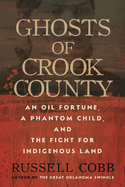
Corrupt oil barons and desperate people struggle to possess a plot of oil-rich land in the meticulously researched, vividly told Ghosts of Crook County: An Oil Fortune, a Phantom Child, and the Fight for Indigenous Land, a work of historical nonfictionby fourth-generation Oklahoman author Russell Cobb (The Great Oklahoma Swindle).
Cobb thoroughly explores the practice of land transfers "from Native hands to the portfolios of white oilmen and their companies" via a single case, that of the allotment granted to a deceased boy named Tommy Atkins. The boy's mother allegedly made a tidy sum by signing the land over to famous early-1900s Tulsa philanthropist and oilman Charles Page, who made much of his fortune from oil drilled on Tommy's land. Cobb digs deeper into the facts of the case and finds "a legal Pandora's box containing vital questions about land ownership, racial identity, and oil wealth." Several trials attempted to decide who owned the rights to Tommy's land. Was it Page, the woman claiming to be Tommy's mother, one of the men who claimed to be Tommy himself, or the Muscogee Nation? Cobb asks the real question: Did Tommy Atkins even exist?
Cobb spent six years researching this book and notes that the historical issues it raises still affect contemporary Oklahoma: "We can only ignore these voices for so long." He introduces readers to swindlers, greed-driven white men, Muscogee citizens caught between opportunists and the law, and a Black woman who peddled liquor and other vices. True-crime and social science readers will find this tangled tale fascinating. --Jaclyn Fulwood, blogger at Infinite Reads

